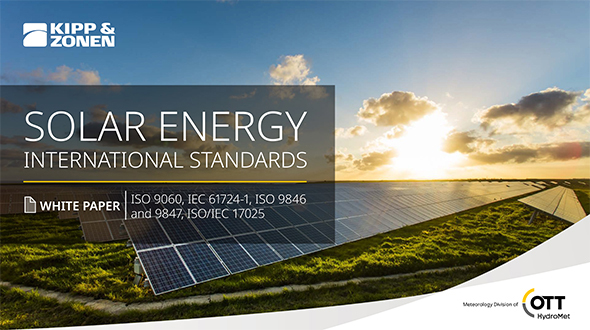In solar energy there are a number of international standards to consider when it comes to PV plant operation and maintenance. Some of these also apply in the earlier phases of design, procurement and construction. The standards and levels selected for a solar project also influence the products required to monitor solar irradiance and environmental conditions.
To help make sense of a somewhat complicated subject, we have summarized the most relevant ISO and IEC standards that apply to weather monitoring in a whitepaper: ‘ Solar Energy International Standards’.
IEC 61724-1 PV System Performance Monitoring
This standard defines terminology and classifies equipment and methods for the performance monitoring and analysis of solar energy plant systems; from irradiance input to AC power output. In the whitepaper we explain how IEC 61724-1 applies to the specification and maintenance of equipment for monitoring irradiance and other weather parameters.
ISO 9060 Pyranometers and Pyrheliometers
As the leading manufacturer of pyranometers and pyrheliometers, ISO 9060 is one of the major standards Kipp & Zonen works with. ISO 9060 is titled ‘Solar energy - Specification and classification of instruments for measuring hemispherical solar and direct solar radiation’. It defines what a pyranometer is for measuring global horizontal or tilted irradiance (GHI and POA) and, when shaded, DHI. It also defines what is a pyrheliometer for measuring DNI.
ISO 9060: 2018 Update
The original 1990 standard has been revised and was published in November 2018. The main difference is that the classes of pyranometer have changed from Secondary Standard, First Class and Second Class to A, B and C. In the whitepaper you will read more about the update, what ‘Spectrally Flat’ means and how Kipp & Zonen pyranometers are classified under the update.
ISO Calibration Standards
Various international standards related to solar energy, including IEC 61724-1, require that pyranometers are calibrated in accordance with ISO 9846:1993 or ISO 9847:1992. There are both indoor and outdoor possibilities for calibration that are described in the whitepaper. Also explained is how to make a site confidence check of pyranometer performance between calibrations.
ISO/IEC 17025 Accreditation
This standard covers the ‘General requirements for the competence of testing and calibration laboratories’. Kipp & Zonen’s radiometric laboratory at the factory in Delft, the Netherlands is accredited for the sensitivity calibration of pyranometers and pyrheliometers. The whitepaper explains what this means.
Download the whitepaper by submitting the form and get an overview of the most relevant international standards in solar energy.
